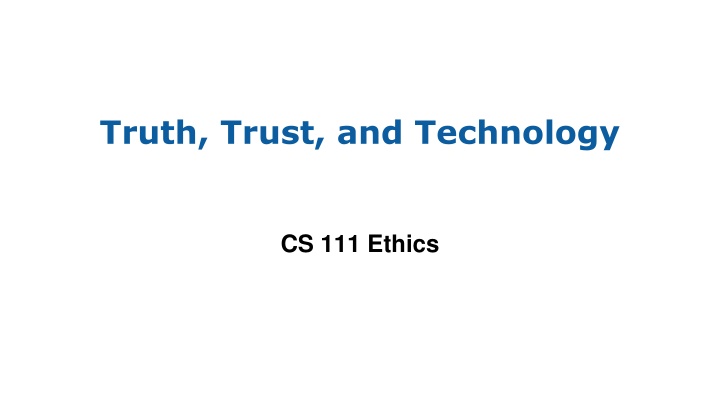
Understanding the Impact of Trust, Truth, and Technology on Societal Conflicts
Explore the complex interplay between trust, truth, and technology in societal conflicts, delving into how differing beliefs, agential gullibility, and technological influences shape perceptions and spread misinformation. Gain insights into issues such as confirmation bias, large-scale agential gullibility, and the role of platforms like Facebook in shaping perspectives and reinforcing biases.
Download Presentation

Please find below an Image/Link to download the presentation.
The content on the website is provided AS IS for your information and personal use only. It may not be sold, licensed, or shared on other websites without obtaining consent from the author. If you encounter any issues during the download, it is possible that the publisher has removed the file from their server.
You are allowed to download the files provided on this website for personal or commercial use, subject to the condition that they are used lawfully. All files are the property of their respective owners.
The content on the website is provided AS IS for your information and personal use only. It may not be sold, licensed, or shared on other websites without obtaining consent from the author.
E N D
Presentation Transcript
Truth, Trust, and Technology CS 111 Ethics
Trust Refresher What is trust? An unquestioning attitude Beneficial because it extends agency Ways to establish trust Assumption (weak, risky) Inference (most powerful) Substitution (build on something else you trust) Trust is essential but risky Agential gullibility: misplaced trust CS 111 Ethics: Trust, Truth, and Technology Slide 2
Societal Conflicts Trust plays a key role in our country s divisions Different groups have conflicting beliefs about basic facts: Who won the election? Is the economy getting better or worse? Is crime rising or falling? Is climate change happening? If so, are humans responsible? There is only one truth: tens of millions of people are wrong!! CS 111 Ethics: Trust, Truth, and Technology Slide 3
Large-Scale Agential Gullibility (What I Believe) >>> (What I Perceive) Individuals don t have resources to answer questions ourselves We must choose to trust information/conclusions from others Different groups trust different sources on key issues of fact Some of these sources must be wrong: agential gullibility Why agential gullibility on such a large scale? Hard to reliably infer trust Error-prone inference techniques: Confirmation bias: I trust this source because it validates my beliefs False trust in numbers: Lots of people are saying this, so it must be true Technology is exacerbating agential gullibility CS 111 Ethics: Trust, Truth, and Technology Slide 4
Example #1: Facebook Attention => $$ Reinforcing biases and fears increases attention (users aren t interested in conflicting views/data) Result: users see lots of material confirming their beliefs Different users see different material Facebook profits from your confirmation bias Takeaways: != truth Optimizing for attention leads to bad places CS 111 Ethics: Trust, Truth, and Technology Slide 5
Example #2: ChatGPT Generative AI tools can produce useful and insightful information ChatGPT presentation causes people to infer trust: Authoritative, with explanations (Bansal et al. 2021) Lots of concrete facts (Bower et al. 2024) But, ChatGPT hallucinates; no reason to trust! Embedding ChatGPT in other apps obscures origin of information Takeaways: Do not trust ChatGPT for truth! Treat output as hypotheses to consider All results must be independently validated (must use substitution) CS 111 Ethics: Trust, Truth, and Technology Slide 6
Example #3: Deepfakes Historically: hard to fabricate convincing photos, videos, audios People inferred trust (for good reason) New technology enables compelling fakes Takeaways: Must unlearn trust in photos, videos, and audios Do not trust without additional validation CS 111 Ethics: Trust, Truth, and Technology Slide 7
Small-Group Discussions What observables can be used to separate trustworthy information sources from untrustworthy ones? Indicators suggesting trustworthiness Indicators suggesting untrustworthiness How to prevent confirmation bias? Discuss in groups of 2-3 CS 111 Ethics: Trust, Truth, and Technology Slide 8
Conclusions Trust is at the heart of our societal divisions Deciding whom to trust is becoming more difficult Confirmation bias is extremely hard to avoid Technology makes the problems worse There are objective factors you can use to infer trust (but it s not easy!!) Best hope: institutions with an established record of trustworthiness But, will people trust them? CS 111 Ethics: Trust, Truth, and Technology Slide 9
